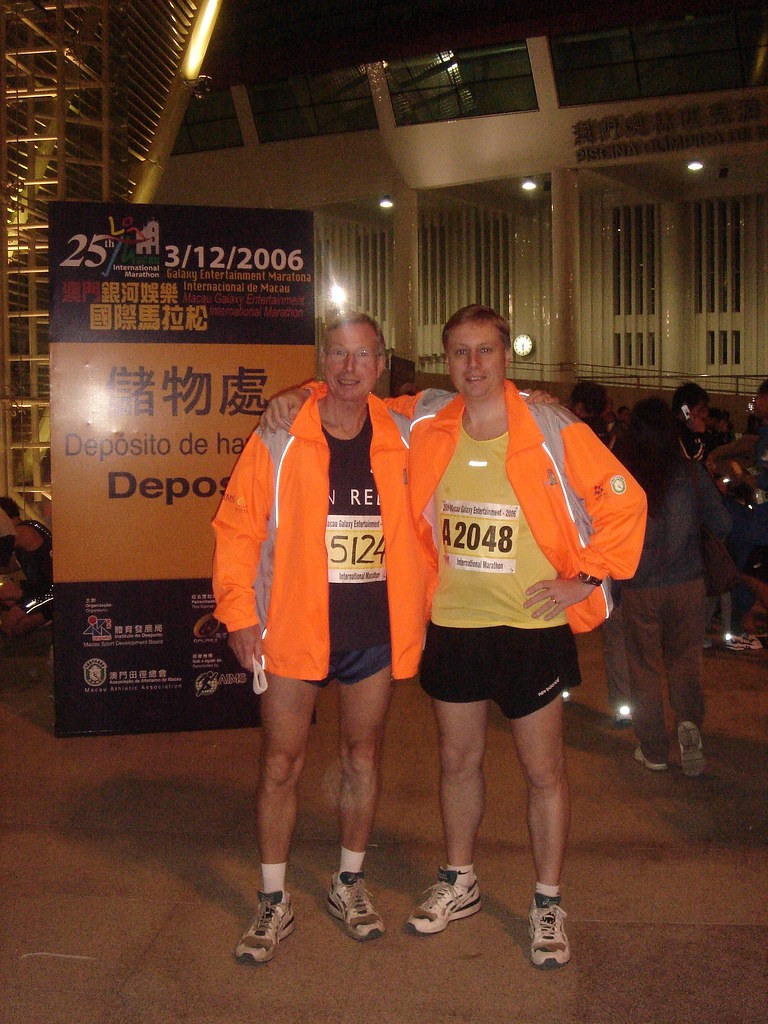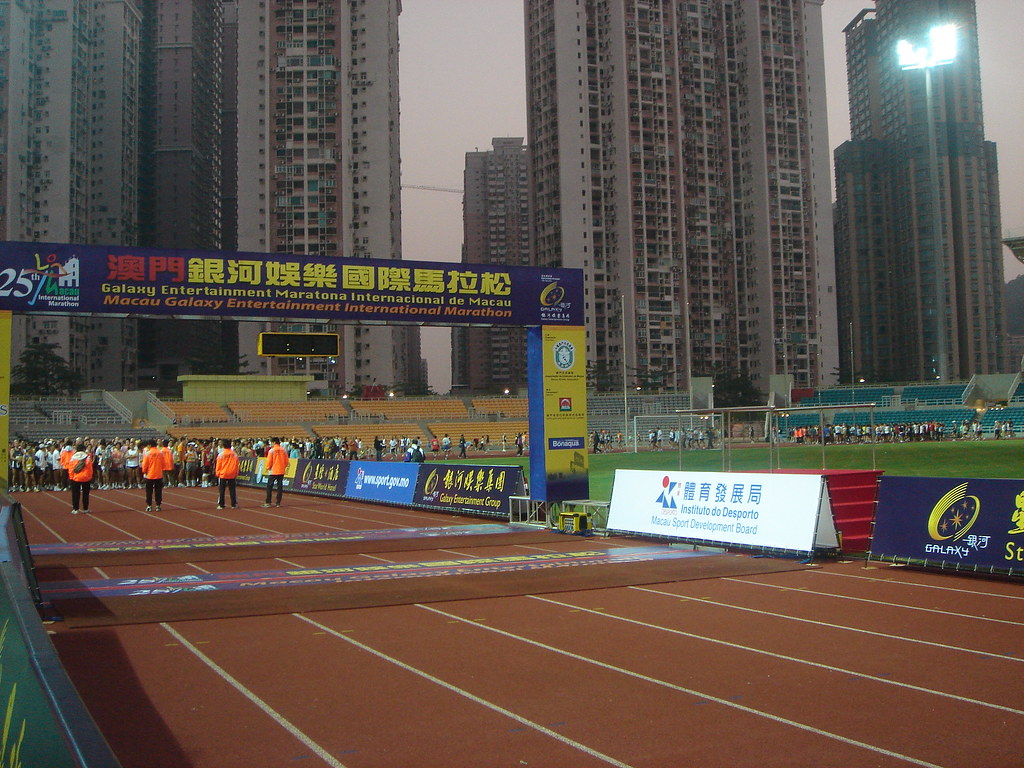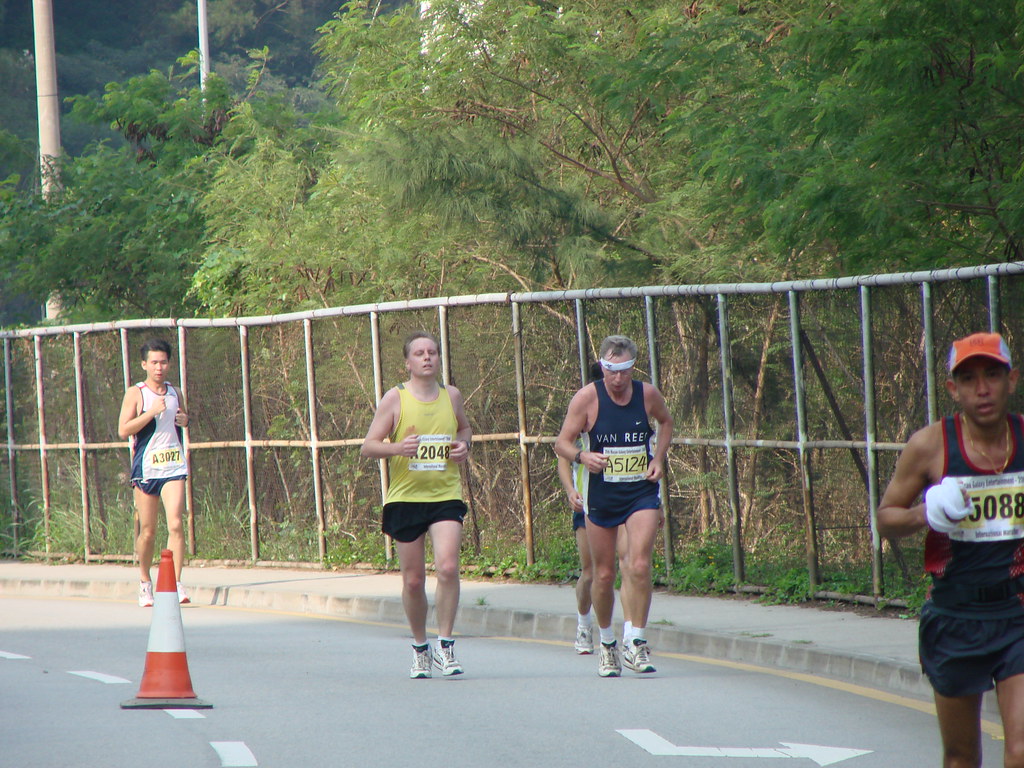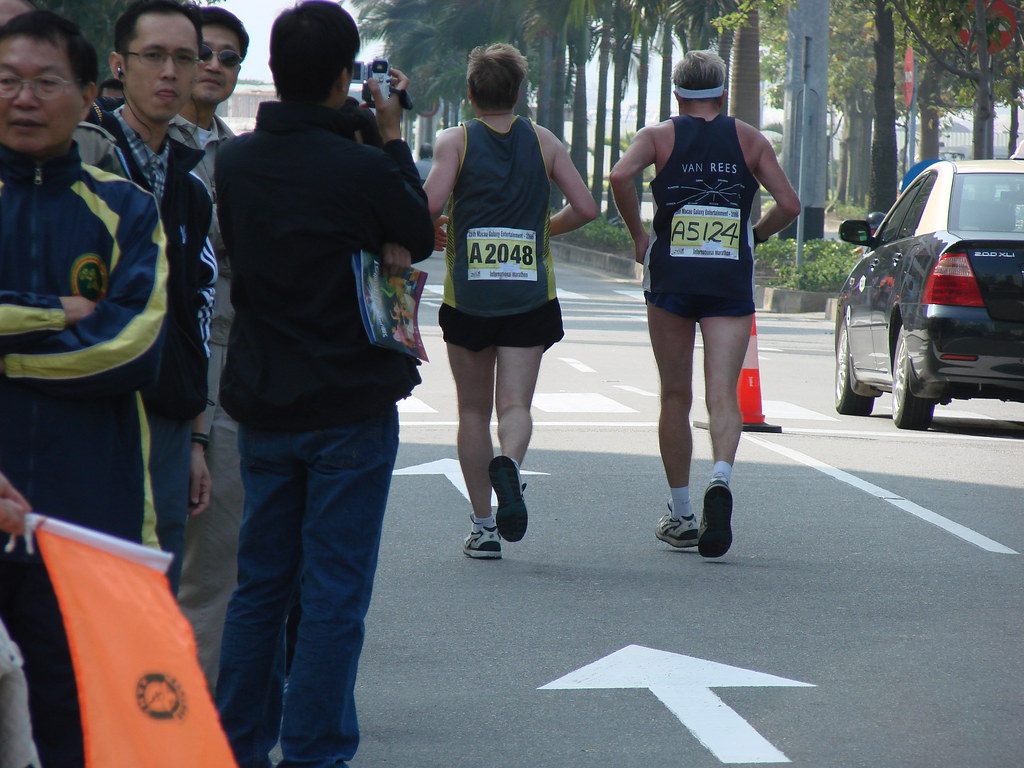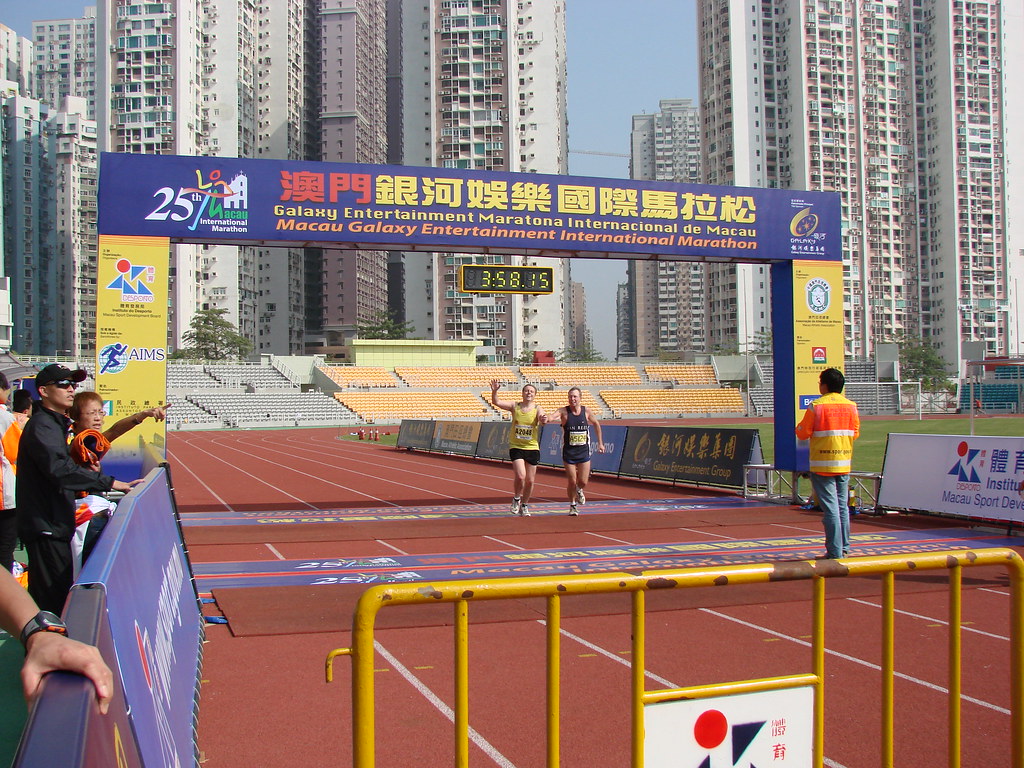Today my dad and I ran the Macau marathon. It was extremely difficult, especially for me. My dad is in a much better shape than me it seems, although he is 26 years older than me. Not only was the course quite diffucult (several steep inclines, including four times a high bridge plus a lot of wind), but I also had dehyrdation problems (I guess it was too warm for me, about 23 degrees), which was a a bit scary. But my dad managed to pull me through, and we both finished in 3:58:16. A new PR for me (last year in Shanghai I was one minute slower). My dad could have probably run it in 3:30 (his PR is below 3:30), but he stayed with me and pep-talked me into a below 4 hour-time. Right now the only thing I want to do is rest, so I keep the blog entry short and add some pictures to give an impression of the race.
Uncategorized
There are 1,067 posts filed in Uncategorized (this is page 75 of 119).
Off to Macau
Last weekend I was in Holland, and had lunch with my parents close to Amsterdam. During lunch we discussed about running a marathon, and about the fact that I could not participate in the Shanghai marathon (which was last Sunday, while I was not in Shanghai). My dad is also a runner, and we had planned to run a marathon together for a long time, but it never materialized.
Because I knew this weekend the Macau marathon would be organized, we tallked about this and decided right there to both fly to Macau (he from Amsterdam, myself from Shanghai) to run the full marathon there. Not sure if it’s a smart idea, because I have not trained enough (nor has my dad). But it was my goal to run one marathon a year, and if I have a goal I to stick to it.
So I am off to Macau later today. The marathon will start Sunday morning at 7 AM. Wish me luck !
What's your marriage worth?
The value of a marriage in the suburbs of Shanghai seems not to be worth more than USD 7000. At least, that is my conclusion after a funny story in today’s Shanghai Daily. In Luchao Harbour (in Shanghai’s Nanhui District) the authorities noted that in 2006 already more than 400 people had gotten divorced, although in 2005 the total was only about 100.
After some investigations they found that most people got married to someone from outside Shanghai right after their divorce. And these marriages in turn also did not last long. After divorcing again the original partners would get back together again and remarry. A very strange behaviour. But it turned out economic incentives were behind it.
It all started when a new town was planned to be built, and people had to relocate for that. However, if they did not have a local housing certificate they would not get an allowance to move. Because most people from outside Shanghai did not have this, the government decided that all non-Shanghainese would automatically get an allowance. So smart villagers figured out that if they divorced and married a non-Shanghainese they could earn some extra cash (about USD 7000, to be shared with the new spouse). And that’s what happened. Everybody participated, even a senile 91 year old whose family married her off to get an extra allowance. As the Shanghai Daily reported “she’s not even aware of her new husband’s last name”.
But the fun did not last long, because the government closed the loophole. Now marriages have to last at least 2 years before qualifiying for an allowance. One village lady had really bad luck. First she divorced her husband, married a non-local and divorced him again. But now she does not get the allowance anymore. And to make matters worse, her ex-husband now refuses to re-marry her!
Blackmailing government officials
A not-so-smart Chinese man read about the corruption scandal around Shanghai’s Party Secretary Chen Liangyu, and saw an opportunity to make some easy money. Many of the people around Chen have been detained because of financial malversations, and he (probably rightfully) assumed that many more would be involved. He decided to blackmail more than 100 Shanghai government officials, saying that he was part of the Party’s discipline commission and was going to investigate them. He wrote a letter saying that he knew the receiver was involved with the Party Secretary, and asked for money to be transferred into his bank account. And that was of course the weak link. None of the officials transferred money into his account, but the man was caught when he was checking his balance at an ATM near his home. He learned the hard way that you should not mess with the government in China – and certainly never provide them your bank account number.
(source: Shanghai Daily)
Getting rich quickly with games
A Chinese student living in Japan managed to make 1.3 million USD over the past 9 months – with games. Not by participating in high-paying tournaments, but simply by selling in-game items (virtual products that can be used in games) on an auction site. According to this article he was not able to enjoy his riches long though: his student visa did not allow him to earn money in Japan so he ended up in jail… The good news is that once released he will be able to continue his work from China, because this kind of work can of course be done from anywhere in the world.
Spill Group Game Award 2006
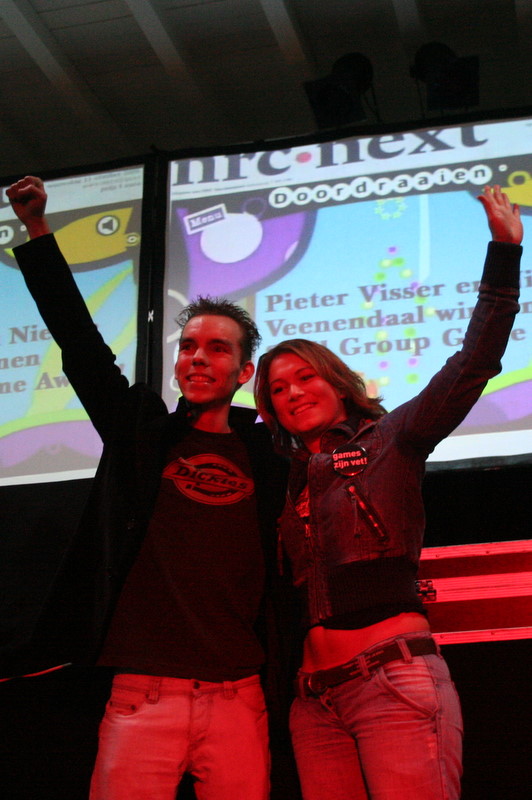 This week the winner of the Spill Group Game Award 2006 was announced during the Dutch Gaming Days. This year Pieter Visser and Nienke Veenendaal won the prize for the best flash game. They received EUR 20,000 for the webgame ‘Doordraaien’ (literally translated as ‘Keep on turning’) that they created especially for this competition. In the picture the very happy winners right after they received the award during the party in Utrecht’s Centraal Museum.
This week the winner of the Spill Group Game Award 2006 was announced during the Dutch Gaming Days. This year Pieter Visser and Nienke Veenendaal won the prize for the best flash game. They received EUR 20,000 for the webgame ‘Doordraaien’ (literally translated as ‘Keep on turning’) that they created especially for this competition. In the picture the very happy winners right after they received the award during the party in Utrecht’s Centraal Museum.
If you want to play the game you can find it here. Later we also plan to put the game on our Chinese portal game.com.cn.
Are Dutch game developers naive?
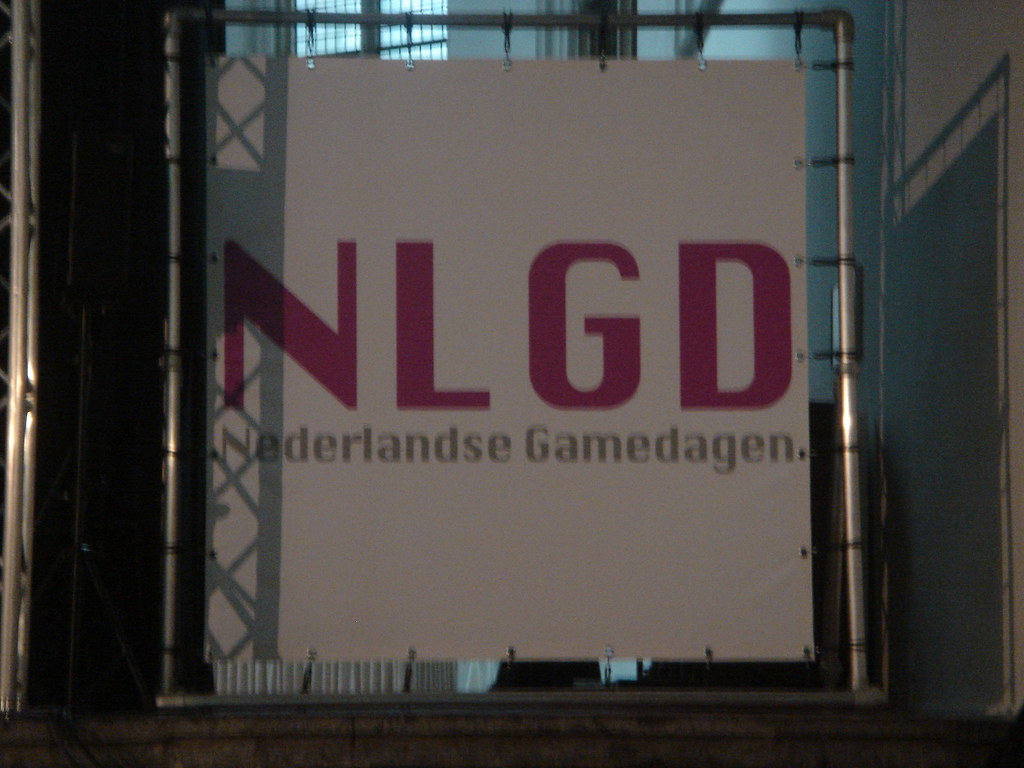 During the past days I was among others in the Dutch city of Utrecht to attend the Nederlandse Gamedagen (Dutch Gaming Days), a two-day conference about gaming. Although most of what was discussed there is not relevant for this blog, I noted a few things that I would like to mention. One of the themes that was discussed during the conference was internationalization, something that really interests me. But the panel discussion was not what I expected from it.
During the past days I was among others in the Dutch city of Utrecht to attend the Nederlandse Gamedagen (Dutch Gaming Days), a two-day conference about gaming. Although most of what was discussed there is not relevant for this blog, I noted a few things that I would like to mention. One of the themes that was discussed during the conference was internationalization, something that really interests me. But the panel discussion was not what I expected from it.
Two Dutch game developers, a professor and two Americans that run a game studio in Holland, discussed the current and future trends of game development internationalization. These guys should be business people, but to me they sounded incredibly naive. Which countries do you think they see as a threat in terms of competition? Canada and France, not countries like China and India. And what should be done about that? The Dutch government should subsidize game developers so they can be more competitive… Come on guys, if you need subsidies you’d better close down your company and choose a different line of business.
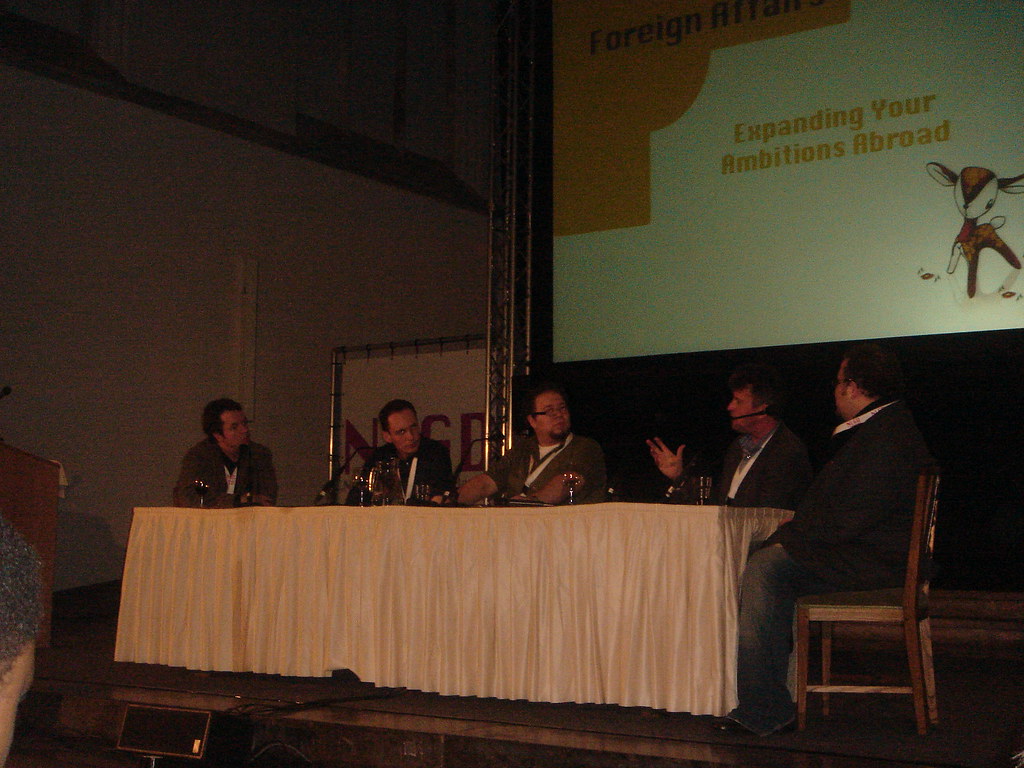 China and India were mentioned, but they felt these countries are no threat. According to them companies there are not as creative, so they are no big danger. True, but things change incredibly fast. So don’t be fooled by believing this will stay like this. Furthermore, and this really made me laugh, they said that a 20-30% lower price in these countries would not be sufficient for game publishers to make their games there. First of all, 20-30% is a lot of money, and most business people would be very interested in finding a partner that can reduce their purchasing prices by this amount. But the fact is that prices in China are probably 50-60% lower than prices in Holland (and sometimes up to 80% lower – I know this from my own experience). There is no way Dutch game developers can survive in a price battle against China. Their argument that salaries in China are catching up fast is also totally wrong: of course salaries grow fast, but it will take decades to bring them at the same level.
China and India were mentioned, but they felt these countries are no threat. According to them companies there are not as creative, so they are no big danger. True, but things change incredibly fast. So don’t be fooled by believing this will stay like this. Furthermore, and this really made me laugh, they said that a 20-30% lower price in these countries would not be sufficient for game publishers to make their games there. First of all, 20-30% is a lot of money, and most business people would be very interested in finding a partner that can reduce their purchasing prices by this amount. But the fact is that prices in China are probably 50-60% lower than prices in Holland (and sometimes up to 80% lower – I know this from my own experience). There is no way Dutch game developers can survive in a price battle against China. Their argument that salaries in China are catching up fast is also totally wrong: of course salaries grow fast, but it will take decades to bring them at the same level.
If I look at Zlong Games (the company that was bought by Spill Group Asia a few months ago) for example, they produce at least the same quality products as the Dutch studios. But until now they were not very competitive in the international market. Because of cultural and language barriers, but also because they did not have the right contacts outside China. We put an experienced foreign sales manager in their company, and I am also helping them in their day-to-day business with foreign clients. The management of Zlong Games is very smart and learning incredibly fast, so they might not need me anymore one or two years from now. And that’s my goal of course, they should learn from us and then do it themselves. Their prices are much lower than what Dutch studios will ever be able to achieve, and they will stay much lower. And this is just one company (although a top one), I know many more that could achieve the same. Watch out Dutch game developers!
Running in the rain
Last night I arrived in Holland for some business meetings. This time I went with two colleagues from Spill Group Asia, Demi (marketing director) and Han Bing (GM of Zlong Games). We had a quick dinner upon arrival in Hilversum (dim sum in a Chinese restaurant), and after that I wanted to do some work. However, I was suddenly so tired that I decided to get some sleep and get up early. That was probably a good idea, because when I watched the 10 PM news in bed instead, I fell asleep during the newscast already.
So I got up at 4 AM to scan through all the mails from Monday, and managed to finish this by 5:30 AM. Then I put on my running gear, and went for a run. Outside it was still pitch dark and it was completely silent. Although it was raining and quite cold (around 7 degrees) I found it very beautiful. First I ran around the Hilversum city center (I always want to know exactly where I am) and then decided to run to Lage Vuursche. But halfway there it was so dark in the woods that I decided to go back to the main road and run to Baarn instead. It was still very quiet and I ran on the bike lane next to the road. That was covered by leaves, and together with the rain it was a very nice environment to run.
Close to Baarn the rain stopped, and within 10 minutes the sky had cleared completely. I saw the stars in the black sky, something you cannot see in Shanghai (you are lucky to see the moon!). On the way back I passed by castle De Hooge Vuursche. With the start-filled sky above it and the dark woods behind it was an amazing sight.
The running went excellent, probably also because I did not run outside for a few weeks, and it felt great. I got back to Hilversum in just over 1 hour and 30 minutes. I could feel all muscles in my legs (I am not used to run on asphalt anymore), but felt very fit. A great start of the day. I am going to have breakfast now with my colleagueas, and then I am ready for my real working day!
Autumn
Suddenly it’s getting cold in Shanghai, yesterday a cold front arrived and the weather has changed completely. Today’s high should be 17 degrees, but to me it feels more like 10 degrees Celcius. It seems autumn has finally started, with continuous rain since early this morning and a dark grey sky. It’s just past 4 PM and it’s already getting a bit dark outside. In a way I like it, it has been warm too long already, and I can finally start wearing winter clothes again.
But I don’t envy all the people that try to hail a cab on the streets. If it rains in Shanghai everybody all of a sudden wants to take a taxi, and as a consequence none are available. While driving to work this morning a taxi stopped in front of my car to let a person out. Right away a young guy and a middle-aged woman came running to the cab and started to fight who could take it. The young guy won, because he just jumped in and slammed the door shut. The taxi took off right away, leaving the woman standing in the rain. I felt bad for her.

